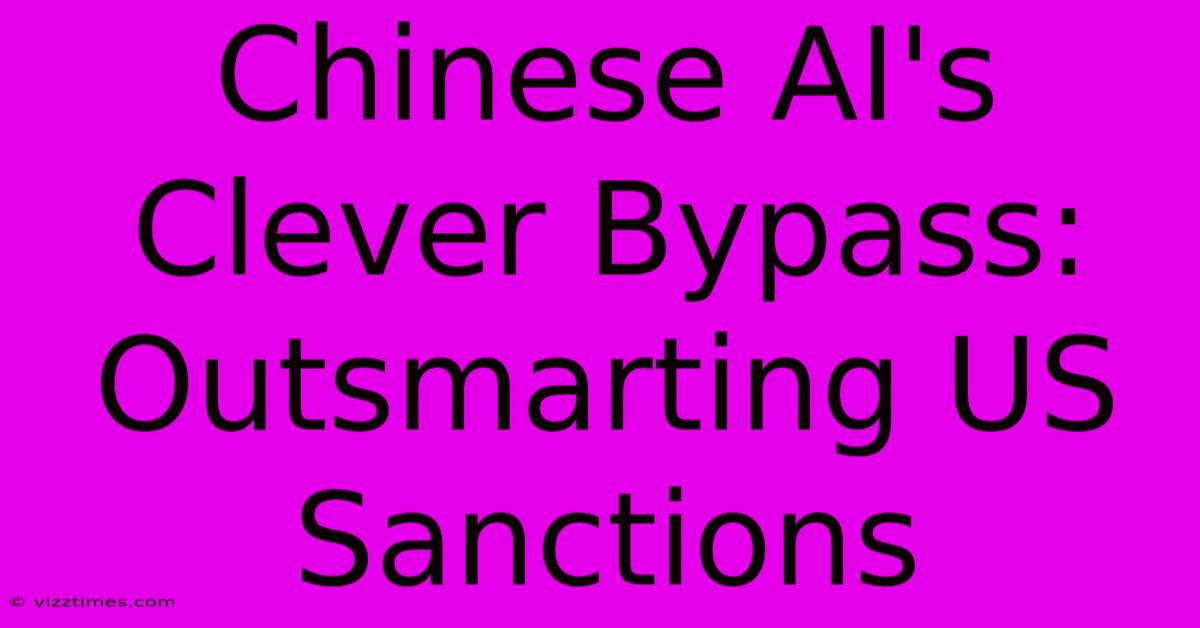Chinese AI's Clever Bypass: Outsmarting US Sanctions

Table of Contents
Chinese AI's Clever Bypass: Outsmarting US Sanctions
Hey everyone, let's talk about something pretty wild – how Chinese tech companies are, shall we say, creatively navigating US sanctions on AI tech. It's a fascinating cat-and-mouse game, and honestly, sometimes I'm amazed by their ingenuity. But let's be clear: This isn't just some academic exercise; it has serious geopolitical implications.
The Sanctions Squeeze: Why are we even talking about this?
The US government, worried about China's rapid advancements in artificial intelligence and its potential military applications, has imposed various restrictions. Think export controls on high-performance chips crucial for AI development. The goal? To slow down China's AI progress. Pretty straightforward, right? Wrong. Turns out, China's not exactly playing by the rules, and their workarounds are, well... impressive.
The "Hidden" Supply Chains: More like a secret underground network.
One of the most significant strategies employed is the creation of shadow supply chains. I'm talking about incredibly complex networks that smuggle in restricted technology, often through third-party countries. It's like a real-life game of international hide-and-seek. I read about one case where a company seemingly imported seemingly innocuous components – like, you know, everyday electronics parts. But these parts, when assembled, formed the building blocks of a high-performance chip. Sneaky, right? It's like they’re building Legos, but the instructions are top secret.
These aren't just small-time operations either. We're talking about significant players with the resources and know-how to pull off these complex maneuvers. It’s way beyond just a few guys in a garage. This involves large networks of companies and individuals collaborating to circumvent these regulations. It's a testament to their resilience and resourcefulness. This whole situation is super complex, and I'm still trying to wrap my head around all the nuances.
Domestic Production: A Focus on Self-Reliance
Another smart move by China has been a significant push towards domestic chip production. They're not just relying on imports anymore; they're investing heavily in developing their own capabilities. I mean, HUGE investments. This isn't some small-scale initiative; it's a national-level effort to become self-sufficient in crucial AI technologies. It's a long-term strategy, and frankly, it’s pretty impressive to see how quickly they are making progress in this area.
While the chips might not be as advanced yet, they’re getting there. They're constantly improving, bridging the gap between their current capabilities and the advanced tech restricted by the US. This focus on self-reliance also has the added benefit of reducing their reliance on foreign technologies, strengthening their overall technological independence. It’s a win-win for them; at least in theory.
Open-Source and Reverse Engineering: The power of community and ingenuity
This one's a clever tactic. Leveraging open-source AI tools and technologies allows China to access and adapt advancements made globally. Think of it as a giant, collaborative project. They take advantage of publicly available information to fill gaps in their own tech. It's like a massive crowdsourced effort. And yes, there is some reverse engineering going on. This isn't necessarily illegal, but it highlights how they are using every available resource to enhance their AI capabilities.
Now, reverse engineering is a double-edged sword. While it can lead to innovation, it can also raise concerns about intellectual property rights. This aspect of the situation is really complicated and raises some serious ethical questions. There are definite legal and moral grey areas here that require careful consideration.
The Human Element: The unsung heroes (or villains)
Let’s not forget the people involved. These aren't just faceless corporations; they're driven by brilliant engineers, skilled technicians, and ambitious entrepreneurs. These individuals are the key players in this complex game. It takes exceptional talent and determination to bypass these sanctions, so a huge shout-out to their ingenuity, I guess.
But obviously, these actions have far-reaching consequences. The implications for global security, economic competition, and technological advancement are profound. The US sanctions are intended to hinder China's military applications of AI, but the effectiveness of these sanctions is questionable, given China's persistent efforts to find ways around them. It's a very complicated story.
My Personal Take: A Balancing Act
Look, I'm not here to take sides or condone any illegal activity. But it’s impossible to ignore the sheer determination and innovation displayed by Chinese companies in navigating these sanctions. Their strategies are a combination of smart planning, resourcefulness, and, frankly, a bit of luck. They've demonstrated a remarkable ability to adapt and overcome significant obstacles. What's happening here really makes you think about the future of technological competition on a global scale.
I’ve made mistakes in the past by focusing too heavily on one aspect of a story. I’ve come to see this is a super nuanced situation. It's not simply a matter of "good guys" versus "bad guys," but rather a complex interplay of geopolitical interests, technological innovation, and national security concerns.
What do YOU think? Let me know your thoughts in the comments below. This is a rapidly evolving situation, and I'm eager to hear your perspectives and insights. I'm really trying to wrap my head around all the details myself, and any discussion would be welcome! Let's have a productive conversation on this!

Also read the following articles
| Article Title | Date |
|---|---|
| 76ers Shock Cavaliers 21 Three Pointers Fuel Upset Win | Jan 25, 2025 |
| Carolina Hurricanes Make Massive Trade Adding Rantanen And Hall | Jan 25, 2025 |
| Jannik Sinner Triumphs Key Moments From His Australian Open 2025 Win Over Ben Shelton | Jan 25, 2025 |
| Chinese Ais Clever Bypass Outsmarting Us Sanctions | Jan 25, 2025 |
| From Loss To Victory How The Sixers Beat The Cavs | Jan 25, 2025 |